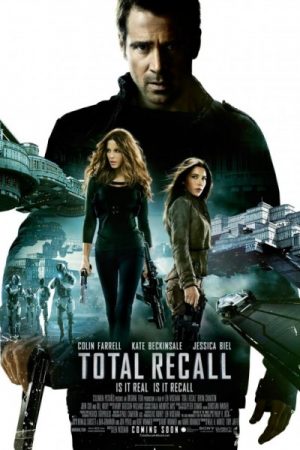
Because no one demanded it, Len Wiseman presents his rendition of Paul Verhoeven’s Total Recall, a 1990 Arnold Schwarzenegger vehicle loosely based on Philip K. Dick’s short story We Can Remember It for You Wholesale. If it seems the director might have better spent his time reviving a less dated franchise, consider the struggles Hollywood filmmakers have had reinventing beloved properties. By comparison, this hardly awaited remake proves quite entertaining even if it lacks in conviction.
The premise remains much the same as in the first Total Recall. Collin Farrell plays Douglas Quaid, a working class everyman who dreams of a more exciting life. We’re not entirely sure why, given his loving wife Lori is portrayed by Kate Beckinsale, but his longing leads him nonetheless to Rekall, a neurological travel agency that specialises in implanting fake memories of your wildest fantasies. The procedure goes wrong to say the least, and Quaid discovers he’s a secret agent who holds the key to stopping Chancellor Cohaagen (Bryan Cranston) from waging war against the Colony, the last inhabitable territory free of the United Nations of Britain.
Gone is the secondary Mars setting, arguably the weakest part of Verhoeven’s movie. Instead, we get an overpopulated Earth in which floating building structures are built one atop the other and smartphone technology can be embedded into the palm of one’s hand so that every glass surface it touches turns into a tablet computer. I love the aesthetic, which will remind most of prior Dick adaptations like Blade Runner (1992) and Minority Report (2002), though I think it’s meant to pay tribute to the short-lived television series Total Recall 2070.
At any rate, this derivative vision of the future allows for fantastic action sequences, including a multi-level car chase in which hover vehicles glide over and under high-rise freeways by way of magnets and a zero-gravity shootout in a subway train that implausibly traverses the planet’s core. I dig as well the hot pursuit on elevators that move along both the X and Y axes. Each instance feels as if Wiseman were adding an extra dimension to a familiar set piece. Plus, his wife Beckinsale kicks major butt. It’s rare that an actress looks like she can open a bigger can of whoopass than Jessica Biel, who plays the resistance fighter of Quaid’s dreams (literally).
Interestingly, the new Total Recall downplays any doubt as to whether our hero is a turncoat spy or living out an implanted fantasy. I’m not complaining, mind you, as I never thought the plot point worked in the original. The idea here, I think, is that Quaid doesn’t care. He came to Rekall for a grand adventure, and, now that he’s got one, he’s not inclined to question it. Consider the scene in which a familiar figure implores him to reject his unlikely new reality. Quaid doesn’t outwit the negotiator as Schwarzenegger did twenty years ago but makes an arbitrary decision as to what version of events he wants to believe.

That’s an interesting notion, but the film doesn’t take the time to explore its implications or any of the themes inherent to the premise. Any story dealing with false memories and manufactured identities should tackle the debate of nature versus nurture. For instance, the first Total Recall answered whether our experiences define us completely with a bold and cynical yes. In this version, the characters pose the existential question off-hand, but the plot goes out of its way not to address it, making sure our hero’s old and new personalities share the same values. That, ladies and gentleman, is what’s commonly known as a cop-out.
Otherwise, Total Recall proves remarkably faithful to the source material, referencing its more iconic moments in clever ways. A henchman still loses his arm in an elevator shaft, for example, but this time he’s a robot, allowing the movie to steer clear of the early nineties’ violent excesses. Admittedly, there are perhaps a few too many of these call-backs, and some twists resonate better than others. Case in point: I suspect the red herring at the Fall security gate doesn’t work as well if you’re not familiar with the 1990 version of the scene.
This raises an important question about Total Recall: for whom is this remake intended? Those who don’t know or care for the original will miss out on all the subtle nods, while those who worship it will bemoan the absence of its offbeat subtext. I get the impression Wiseman was trying to serve too many masters at once when he ought to have fulfilled his own creative ambitions. For all its goofiness, Vehoeven’s movie made a strong, memorable statement. This one proves more polished, sure, but harder to recall.






Recent Comments